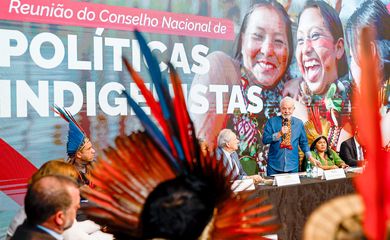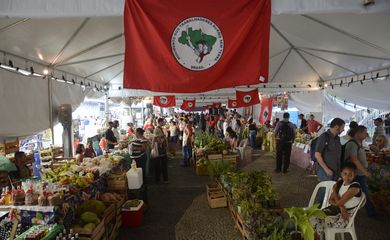Rural conflicts peaked in Brazil in 2023, yet disputed area decreased

In 2023, Brazil saw a record 2,203 rural conflicts, impacting 950,847 people. Despite the increase in both figures from the previous year, the disputed area decreased by 26.8 percent to approximately 59,400 hectares. The data are from the latest edition of the Pastoral Land Commission's (CPT) annual report, released this week in Brasília.

The North and Northeast regions of the country had the highest concentration of conflicts, with 810 and 665 occurrences, respectively. Following them were the Central-West (353), Southeast (207), and South (168).
In 2022, nationwide reports documented 2,050 rural conflicts, affecting a total of 923,556 people.
According to the CPT, land remained the primary focus of rural conflicts. In 2023, 1,724 disputes were over land, making up 78.2 percent of the total recorded cases. This figure also encompasses conflicts related to water (225 occurrences) and work in slave-like conditions in rural areas (251 occurrences), accounting for 10.2 percent and 11.3 percent respectively. Land-related incidents increased by 7.6 percent that year, affecting 187,307 families.
The report highlights that a total of 1,588 land conflicts involved violence related to occupation, possession, or against individuals. Specifically, cases of invasion increased from 349 in 2022 to 359 in 2023. According to the commission, this aggression affected 74,858 families.
Pistolagem, the second type of violence against occupation and possession, reached a record high in 2023. A total of 264 cases were recorded, marking a 45 percent increase compared to 2022. This also represented the highest number of cases recorded by the CPT, affecting a collective total of 36,200 families. The organization highlights that the primary victims were landless workers (130 incidents), squatters (49), indigenous people (47), and quilombolas (19).
The report also reveals concerning statistics regarding conflicts over access to water. In these cases, the primary instigators of violence include farmers, state governments, businessmen, hydroelectric dams, and mining companies. Conversely, indigenous people (24.4%), fishermen (21.8%), river dwellers (13.3%), quilombolas (12.4%), and settlers (8.4%) are often on the receiving end of such disputes.
Causers and victims
The perpetrators of violence in land conflicts include farmers (31.2%), businessmen (19.7%), the federal government (11.2%), land grabbers (9%), and state governments (8.3%). According to CPT experts, despite a “slight decrease in violence” and increased openness from the federal government toward social movements, there has been stagnation in terms of land reform and demarcation of indigenous lands. The report criticizes state administrations for their use of repressive forces, such as the police, and their alignment with policies that violate other basic rights, such as the aerial spraying of pesticides.
The chapter of the CPT report addressing violence against individuals highlights the vulnerability of indigenous communities. It provides a detailed account of aggressions against individuals, supplementing data on the challenges faced by families. In 2023, 554 incidents of this nature were reported, involving 1,467 people. In 2022, the commission documented 561 incidents affecting 1,075 individuals. Comparatively, there was a 1.2 percent decrease in incidents but a 36.4 percent increase in the number of victims from one year to the next.
Indigenous people top the list of victims of this categorized violence (25.5%). Furthermore, in 2023, out of 31 individuals affected, 14 were murdered, marking a 34 percent decrease from the previous year's 47 executions.
Conflict mediation
"Since around 2016 or even earlier, when the Brazilian state ceased its role as a conflict mediator, a vacuum has emerged, allowing self-articulating groups like Invasão Zero to thrive. In reality, Invasão Zero is a revival of the UDR [Democratic Rural Union] from the 1980s and 1990s. This group autonomously undertakes actions such as displacing indigenous people from reclaimed territories and expanding into areas through land grabbing. These areas are often already settled and occupied by traditional communities. Additionally, we are witnessing the emergence of other similar groups," explained Ronilson Costa, the national coordinator of CPT, in an interview with Agência Brasil.
To him, the current state of agribusiness in the country is "archaic." Despite widespread claims of its significant contribution to job creation, the reality, he asserts, is far more imbalanced. "It not only leads to environmental imbalance but also social imbalance, fostering poverty and violence in rural areas," he elaborates.
According to the CPT coordinator, a significant issue arises from the influence of the extreme right at the state level. "It's incredibly complex when we see that the Secretariats of Public Security or the Environment, in many of these states, collaborate to either safeguard or facilitate the expansion of agribusiness. Naturally, the territories of traditional communities and indigenous peoples pose a significant challenge, as they are protected by legislation, including international laws, which closely monitor these advancements. Without such safeguards, one can only imagine the repercussions," he remarks.
The CPT representative believes that the solution lies in the federal government reinstating a comprehensive set of policies for rural areas, extending beyond mere land distribution. ""There's no point in being on land that has been conquered over years of struggle and suddenly not having a road to access it, a bridge, or no incentives to produce. These individuals become abandoned victims of the agrarian reform. Without a doubt, given the chance, these lands will once again fall into the hands of those with easier access to capital to foster production," he states.






